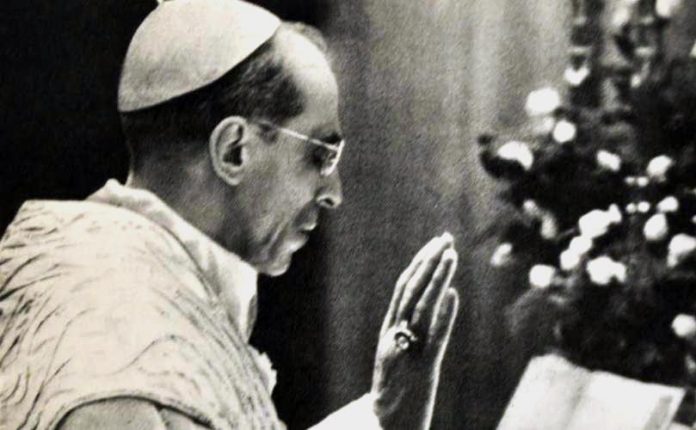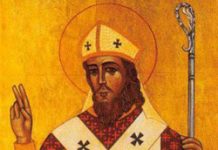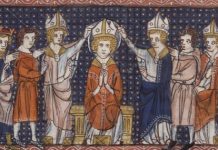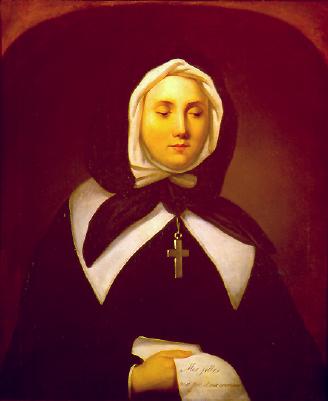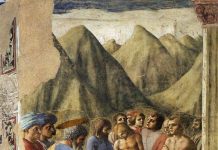(As mentioned in an accompanying post, the Queenship of Mary used to fall on the last day of May (now the feast of the Visitation), and was moved to its current location on the Octave of the Assumption in the 1969 revision of the liturgical calendar. Here are the words of Pope Pius XII proclaiming the feast in this encyclical of 1954)
AD CAELI REGINAM
Venerable Brethren, Health and Apostolic Blessing.
- From the earliest ages of the Catholic Church a Christian people, whether in time of triumph or more especially in time of crisis, has addressed prayers of petition and hymns of praise and veneration to the Queen of Heaven. And never has that hope wavered which they placed in the Mother of the Divine King, Jesus Christ; nor has that faith ever failed by which we are taught that Mary, the Virgin Mother of God, reigns with a mother’s solicitude over the entire world, just as she is crowned in heavenly blessedness with the glory of a Queen.
- Following upon the frightful calamities which before Our very eyes have reduced flourishing cities, towns, and villages to ruins, We see to Our sorrow that many great moral evils are being spread abroad in what may be described as a violent flood. Occasionally We behold justice giving way; and, on the one hand and the other, the victory of the powers of corruption. The threat of this fearful crisis fills Us with a great anguish, and so with confidence We have recourse to Mary Our Queen, making known to her those sentiments of filial reverence which are not Ours alone, but which belong to all those who glory in the name of Christian.
- It is gratifying to recall that We ourselves, on the first day of November of the Holy Year 1950, before a huge multitude of Cardinals, Bishops, priests, and of the faithful who had assembled from every part of the world, defined the dogma of the Assumption of the Blessed Virgin Mary into heaven[1] where she is present in soul and body reigning, together with her only[1a] Son, amid the heavenly choirs of angels and Saints. Moreover, since almost a century has passed since Our predecessor of immortal memory, Pius IX, proclaimed and defined the dogma that the great Mother of God had been conceived without any stain of original sin, We instituted the current Marian Year[2] And now it is a great consolation to Us to see great multitudes here in Rome – and especially in the Liberian Basilica – giving testimony in a striking way to their faith and ardent love for their heavenly Mother. In all parts of the world We learn that devotion to the Virgin Mother of God is flourishing more and more, and that the principal shrines of Mary have been visited and are still being visited by many throngs of Catholic pilgrims gathered in prayer.
- It is well known that we have taken advantage of every opportunity – through personal audiences and radio broadcasts – to exhort Our children in Christ to a strong and tender love, as becomes children, for Our most gracious and exalted Mother. On this point it is particularly fitting to call to mind the radio message which We addressed to the people of Portugal, when the miraculous image of the Virgin Mary which is venerated at Fatima was being crowned with a golden diadem.[3] We Ourselves called this the heralding of the “sovereignty” of Mary.[4]
- And now, that We may bring the Year of Mary to a happy and beneficial conclusion, and in response to petitions which have come to Us from all over the world, We have decided to institute the liturgical feast of the Blessed Virgin Mary, Queen. This will afford a climax, as it were, to the manifold demonstrations of Our devotion to Mary, which the Christian people have supported with such enthusiasm.
- In this matter We do not wish to propose a new truth to be believed by Christians, since the title and the arguments on which Mary’s queenly dignity is based have already been clearly set forth, and are to be found in ancient documents of the Church and in the books of the sacred liturgy.
- It is Our pleasure to recall these things in the present encyclical letter, that We may renew the praises of Our heavenly Mother, and enkindle a more fervent devotion towards her, to the spiritual benefit of all mankind.
(To continue reading, please see here).

